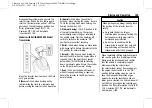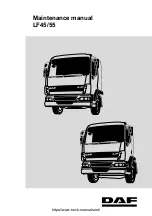
Chevrolet Low Cab Forward 6.7L Diesel Engine 6500XD (GMNA-Localizing-
U.S.-15749874) - 2022 - CRC - 12/1/21
Driving and Operating
181
flakes. If temperatures are low enough,
these flakes can obstruct the fuel filters and
stop fuel from reaching the engine.
At low temperatures, wax flakes are more
likely to form in Number 2-D fuel than in
Number 1-D (or "winterized" Number 2-D)
fuel. For best operation at temperatures
below 32° F (0° C), use Number 1-D or
Number 2-D which has been blended with
Number 1-D for winter use. For additional
details about cold weather fuel requirements
for your vehicle's Cummins diesel engine,
refer to the Cummins Owner's Manual or
contact your local Cummins Dealer.
However, Number 1-D fuel will form wax
flakes when temperatures are
extremely low.
Do not use home heating oil or gasoline in
your diesel engine; either may cause engine
damage.
The addition of kerosene will not unplug a
filter plugged with wax. Warming a "waxed"
filter to a temperature of 0 °C to 10 °C (32 °F
to 50 °F) will return the wax to solution.
Filter replacement is not normally required.
Water in Fuel
During refueling, it is possible for water (and
other contaminants) to be pumped into your
fuel tank along with the diesel fuel. This can
occur if a service station does not regularly
inspect and clean its fuel tanks, or if a
service station receives contaminated fuel
from its supplier(s).
To protect your engine from contaminated
fuel, there is a water separator system on
the engine which allows you to drain excess
water from the fuel.
{
Warning
The drained water/diesel fuel mixture is
flammable, and could be hot. To help
avoid personal injury or death and/or
property damage, do not touch the fuel
coming from the water separator drain
valve, and do not expose the fuel to open
flames or sparks.
Be sure you do not overfill the drain pan.
Heat (such as from the engine) can cause
the fuel to expand. If the container is too
full, fuel could be forced out of the pan.
This could lead to a fire and the risk of
personal injury and/or vehicle damage.
Biocides
In warm or humid weather, fungus, and/or
bacteria may form in diesel fuel if there is
water in the fuel.
Fungus or bacteria can cause fuel system
damage by plugging the fuel lines, fuel
filters or injector. They can also cause fuel
system corrosion.
If fungus or bacteria has caused fuel system
problems, you should have your Cummins
dealer correct these problems. Then, use a
diesel fuel biocide to sterilize the fuel
system (follow the biocide manufacturer's
instructions). Biocides are available from
your dealer, service stations, parts stores
and other automotive places. See your
Cummins dealer for advice on using biocides
in your area and for recommendations on
which biocides you should use. For
additional details about Biocides and other
additives for your vehicle's Cummins diesel
engine, refer to the Cummins Owner's
Manual or contact your local dealer.
Smoke Suppressants
Because of extensive testing of treated fuel
versus untreated fuel, the use of a smoke
suppressant additive is not recommended







































